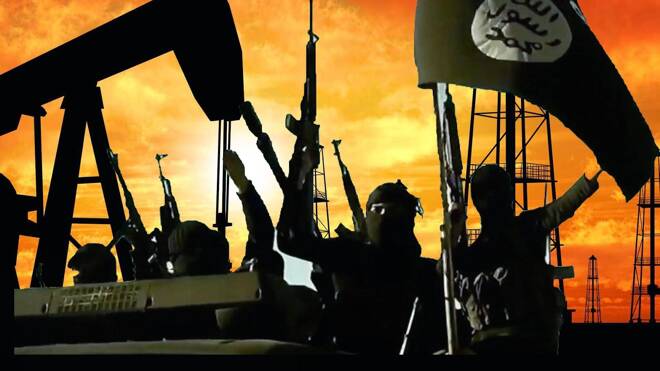Advertisement
Advertisement
Oil Speculators Push Up Prices After ISIS Paris Attacks
By:
As markets open for a new week traders are waiting to see the effects of this weekend’s terrorist attacks in Paris as the world prepares to step up its
As markets open for a new week traders are waiting to see the effects of this weekend’s terrorist attacks in Paris as the world prepares to step up its war against ISIS and terrorism. Oil prices in international markets are expected to come under renewed pressure as fears grow globally that recent terror attacks in Paris may further slow the global economy, lowering crude demand.
Oil is already being traded at near six-year lows and relatively good demand has been the most important factor that has prevented the prices from going any lower as global oil glut keeps worsening, Reuters reported on Sunday. A series of coordinated terrorist attacks in the French capital claimed the lives of at least 129 people on Friday evening, following which ISIS terrorist group claimed responsibility for the bloodshed. Oil closed the week at a low of 40.74 falling $1 on Friday alone. Brent oil kept pace with WTI’s decline to reach 44.47.
According to analysts from Eurasia Group, the attacks will probably undermine the French government’s ability to focus its attention on the country’s improving economy. There seemed to be little reaction in the oil markets to the weekend attacks and the possibility of a step up in attacks on ISIS’s oil production. It is estimated that the terrorist organization is financed by its illegal exports of oil through Iran and Syrian. Crude added 32 cents to 41.06 while Brent oil was up 49 cents at 44.96. The strength of the US dollar weighed on price as the greenback rallied 30 points to 99.19.
An OPEC delegate stated that he also believed that in the mid-term, oil prices would relatively pick up due to rising geopolitical tensions, especially if the international community takes steps to reduce oil smuggling and hits oil facilities under control of Daesh in Syria and Iraq.
Despite the aforesaid facts, the OPEC delegate, who was not named in the report, agreed that the short-term impact of the attacks may put downward pressure on oil prices, saying, “Certainly any more controls — though it ensures safety of travelers – will reduce transport.”
The delegate added that the reaction shown by the markets would depend on the severity and the length of any restrictions enforced across France and the rest of Europe.
The United States and its allies have sharply increased their airstrikes against the sprawling oil fields that the Islamic State controls in eastern Syria in an effort to disrupt one of the terrorist group’s main sources of revenue, American officials said this week.
For months, the United States has been frustrated by the Islamic State’s ability to keep producing and exporting oil — what Defense Secretary Ashton B. Carter recently called “a critical pillar of the financial infrastructure” of the group — which generates about $40 million a month, or nearly $500 million a year, according to Treasury Department estimates.
Meanwhile other geopolitical problems continue to plague the oil markets. Competition is growing in Russia’s biggest oil market. While Saudi Arabia’s encroachment in Europe is getting all the attention, the greatest threat comes from another part of the Middle East — Iran.
Saudi Arabia has started shipping crude to traditional Russian markets like Poland and Sweden, but supplies to Europe from the world’s largest exporter won’t increase by enough to reduce prices.
About the Author
Barry Normanauthor
Advertisement
